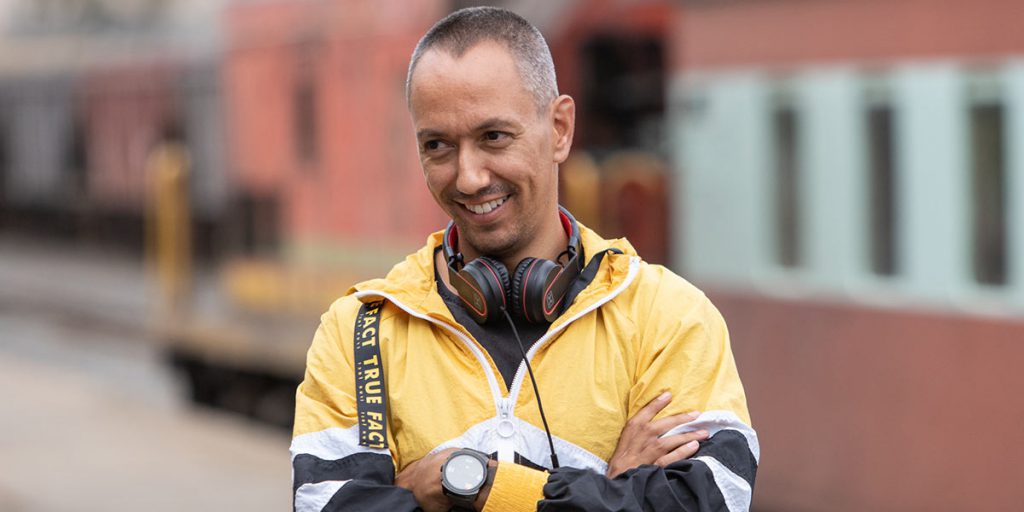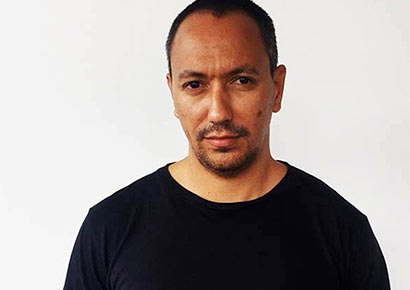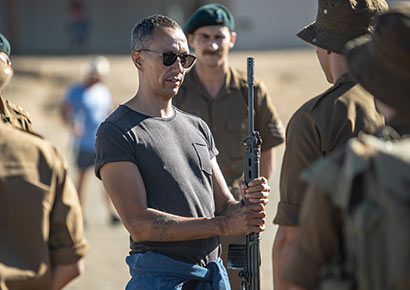Moffie Q&A: Director Oliver Hermanus

Moffie director, Oliver Hermanus
Moffie – about a closeted gay conscript – is possibly South African director Oliver Hermanus’ most provocative film; dealing with queerness and toxic masculinity in the apartheid-era military.
The year is 1981, and South Africa’s white minority government is embroiled in conflict on the southern Angolan border. Like all white men over the age of 16, Nicholas van der Swart must complete two years of compulsory military service to defend the racist apartheid regime.
The threat of communism and the so-called swart gevaar (black danger), the conscripts are told, are on their doorstep. Nicholas knows this is not the only danger he faces. The army is brutal, and his superiors pitiless, but when a connection forms between Nicholas and a fellow recruit, the harsh reality of what would happen if anyone found out reveals an even crueller wasteland.
Moffie (a derogatory Afrikaans term for gay) depicts the dehumanising apartheid indoctrination and brutality faced by young white South African men in the military. It’s a subject that has rarely been explored in South African film. For queer troops, the experience was even more frightening: those who were “caught,” faced being sent to the notorious Ward 22 in Pretoria, where they enured horrific experimental torture in a bid to cure them.
Hermanus’ second film, Skoonheid (Beauty) also dealt with queer issues. The dark drama premiered at the 64th Cannes Film Festival and went on to win the Queer Palm Award.
Moffie – loosely based on André Carl van der Merwe’s memoir about his time in the army – is anther masterpieces of South African queer filmmaking. It’s received acclaim from international critics and film festivals, and it has now finally released in South Africa.
MambaOnline spoke to Hermanus about making Moffie.
What about this story – about “young, gay, white youth living in the [apartheid] 80s” – appealed to you? And why did you feel you were the right person to make this film?
I wanted to make a film about shame and indoctrination. I found that to be the most arresting aspect of the book. I don’t think I was necessarily the right person to make it, just the lucky one who got offered the opportunity.

What was the most challenging aspect of making Moffie, not so much in terms of the production, but for you personally?
For personally, like with all my films, it’s about having to take on the emotion of the film or sometimes the lack thereof. It’s having to live the life of the character in a meaningful way that allows for them to come alive. It’s quite taxing eventually, especially since films, take years to make.
How faithful were you to the source material?
We took a lot of liberties. We really expanded on that theme of shame and indoctrination. We spent a long time doing extra research too, so that the film became [more] about this generation of men.
I was driving the other day and spotted a large billboard for the film. I had very mixed feelings about seeing the word moffie displayed in public on such as massive scale. What are your thoughts about this?
{Laughs] Well the billboards are most certainly a provocation. Just like the film. It is forcing an audience and the public to engage with this word, our history as gay men with this word and then, of course, the want to disarm it.
The film features an almost exclusively white cast and perspective. Were you tempted to find a way to include a more diverse or representative angle into the narrative?
I was very focused on taking an audience, of any race, into the headspace of white South Africa in 1981. That was intentional. Seeing the world, and the programming of hate and racism from that point of view.
What, if any, are the thematic connections, between Moffie and Skoonheid. Are they brothers, cousins, or unrelated?
Unrelated. Skooheid was about the curse of beauty, how it creates value in society and self-judgments. How someone can live a life full of control and order but be completely disarmed by beauty, despite his repression and his self-hate. And how that character ultimately destroys what he cannot have. It’s very much about obsession and possession, again from the point of view of a South African. Moffie is about something else entirely. Well, for me, at least.
What would you say to someone who recently told me that as a queer man he didn’t want to see any more films about what he described as “queer torture” – repression, fear, abuse etc… He’d had enough – he’d seen enough and he’d experienced enough. What are your thoughts about his sentiment?
Totally valid. It’s like someone saying they are tired of Holocaust films. I don’t think that means we should stop seeing those stories or exploring them.

The issue of LGBTQ characters being played by non-LGBTQ actors is a fiery one – with some insisting that queer actors should be getting these roles. What are your thoughts on this?
I think this debate was about equality in Hollywood particularly where it’s felt that films are made about communities for the purpose of exploiting their stories without including them. I don’t see my work that way. I don’t create stereotypes or hybrids for the purpose of pure profit. I work in a different kind of film business. I do see this character as someone who thinks he’s straight, until he’s not, which is a great challenge for a potentially straight actor.
Ward 22 is mentioned and briefly seen in Moffie without a lot of explanation. Why did you choose not to delve more into it and what went on there?
That could be a film on its own, I didn’t want to go too far into as I think it’s so dense with its own stories. I simply wanted to acknowledge it in this film.
With the likes of Inxeba and Kanarie, we are seeing a growing exploration and dissection of South African masculinity in film. Why is this important – and so intriguing and relevant for South Africans?
Perhaps we see how much of our past (and present) is impacted by the way men have been raised and socialised in South Africa.
Let’s talk about the ending of Moffie. Without going into any spoilerish detail, why did you choose to end the film so ambiguously?
I end all my films this way, especially my last one. I don’t believe in closure. [Laughs]
How did making Moffie change you?
Moffie changed me more as a filmmaker I think. It was a massive undertaking and so its been good for my creative confidence and my interest in new stories, particularly those set in the past.
Moffie is now screening in cinemas across South Africa. Read our interview with Moffie star Kai Luke Brümmer here.
First of all thank you for the film. Brought back a lot of memories of that time.
A few thoughts around this.
1. I think this brings into highlight that not only black people stuffed under apartheid but the whole LGBTQI community. And we as a community and society as well should talk about our LGBTQI history and educate the youth.
2. The ending this can show how traumatic the national service was to the youth and how it effected them in their lives and how it changed them.
3 to me a very sore point here and not sure if people saw it this was and i saw it right away as i had a lot of friends who went through ward 22. Where they did untold hecticly bad things to the “Gay” people.
Is the ending not saying that the SANDF conversion therapy worked? Did he not have gay feelings and was GAY then go through ward 22 and come out “straight ” and now has NO gay tendencys?
4. To me and 99.9% of the older genaration when NOW called a Moffie we laugh it off and stand up to the people who said it. But my concern here is the youth who can’t handle it and have NO ways of reaching out for help. I think the producers are not helping out and have missed a great opportunity to reach out to the youth when they talk about the movie. They should or must have help lines and organizations names numbers at the ready and put it out there where the youth can get help or who they can talk to. In the movie you see a suicide but they have not gone that extra mile here to help. Would be great if they could and maybe save a life or more.
Lozi could you follow up and put this to them.